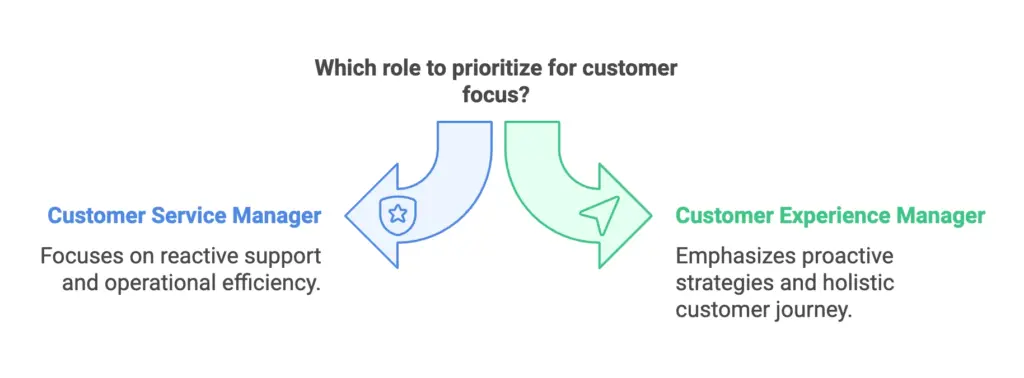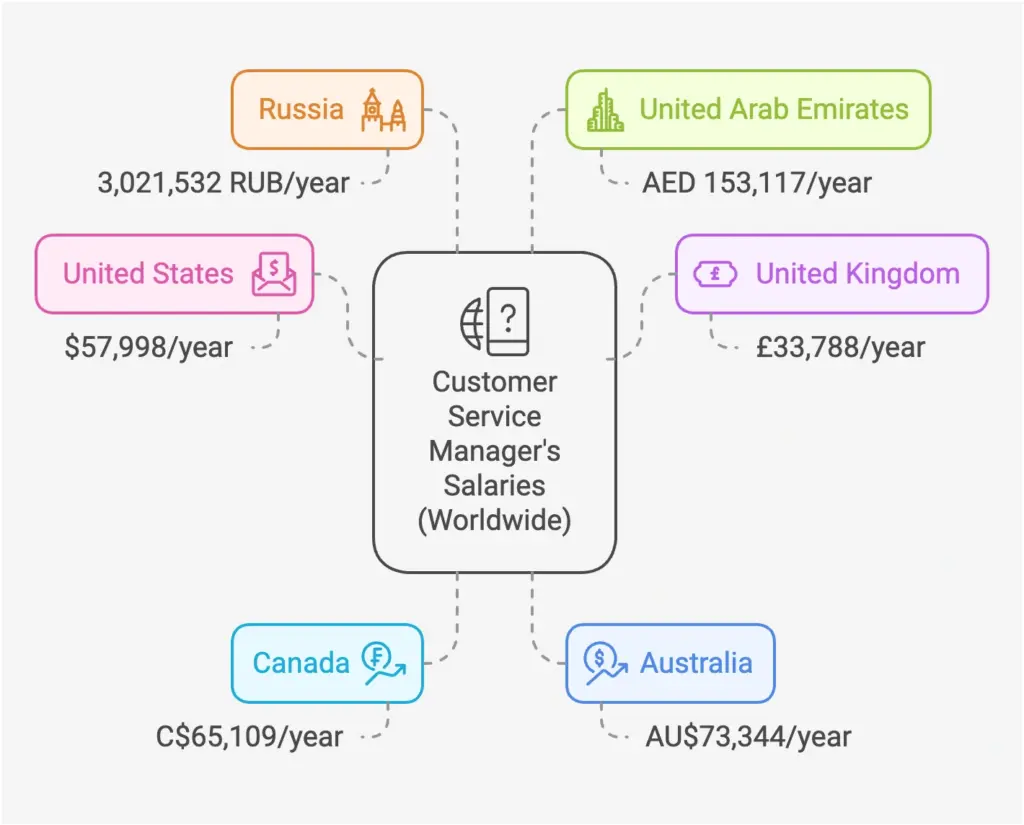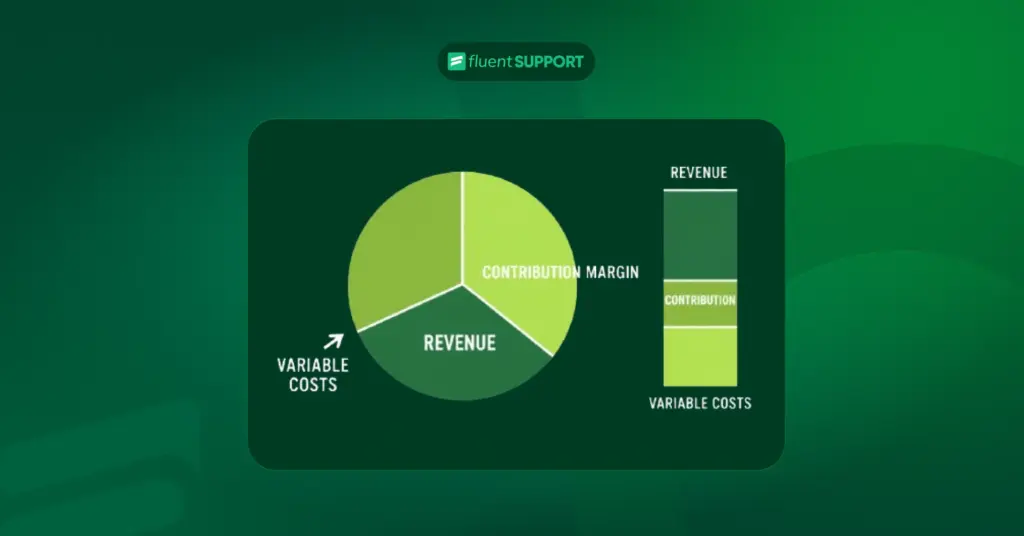
Customer Service Manager: Key Insights and Career Path
By Md. Sajid Sadman
December 27, 2024
Last Modified: October 9, 2025
Every exceptional customer interaction starts with a dedicated Customer Service Manager (CSM) guiding the team to success.
And, what exactly does a Customer Service Manager do—just put out fires, manage the team, and keep customers happy? Or is there a bit more to the role?
Read the full blog to find out how this all leads to the many hats a Customer Service Manager wears.

What is a Customer Service Manager?
A Customer Service Manager (CSM) is the core person of a company’s customer service department who focuses on improving customer service and satisfaction at all levels.
Simply put, a Customer Service Manager’s (CSM) daily routine is to lead the department in ensuring smooth problem resolution and excellent service quality.
A company hires a CSM to guide the department toward success and continuously strive for better outcomes. So, he needs to do everything possible to guide the agents to turn every interaction into a constructive and positive experience.
Moreover, a thoughtful CSM excels at strategic planning. He identifies recurring customer concerns, anticipates potential customer problems, and crafts strategies to improve service quality.
When a Customer Success Manager (CSM) actively oversees the service department, the chance of achieving faster response and resolution rates significantly increases. From resolving to mentoring team members, a CSM is involved in every aspect of customer support operations.
This involvement strengthens customers’ trust in the company’s commitment to delivering great service.
So, the next time you think of a Customer Service Manager, consider them the backbone of a company’s customer relations.
Customer Service Manager (CSM) vs Customer Experience Manager (CEM): Know the difference
Now you have the basic idea of what a Customer Service Manager is. Before delving into it, you need to understand the differences between a Customer Service Manager (CSM) and a Customer Experience Manager (CEM) to avoid confusion.
Basic Idea
A Customer Experience Manager (CEM) is dedicated to ensuring a better customer experience at every touchpoint of a customer’s journey.
A Customer Service Manager (CSM) doesn’t need to touch every interaction in a customer’s journey. He solely focuses on managing customer support operations and whether agents are handling customer issues properly.
Objective
CSM’s role revolves around improving the customer service department’s performance and achieving success.
On the other hand, a Customer Experience Manager puts effort into creating an emotional connection and building customer loyalty through a seamless experience.
Reactive and proactive
A Customer Experience Manager needs to maintain a proactive approach. He needs to anticipate customer needs, collect feedback and act upon it, and craft strategies to deliver a seamless and satisfying experience at every stage of the customer interaction.
On the other hand, a Customer Service Manager is good to go with a reactive approach. He is responsible for reactive communication with customers. Whenever issues arise, his focus should be on reacting swiftly and resolving them as efficiently as possible.

Note: Modern customer service emphasizes on proactive approach to outstanding customer support.
One of our authors covered this topic. You can gain a clear perspective on it.
Metrics
A Customer Service Manager (CSM) focuses on metrics that directly measure the quality and efficiency of customer support, such as First Response Time (FRT), Mean Time to Resolution (MTTR), Average Handling Time (AHT), Customer Satisfaction Score (CSAT), etc.
A Customer Experience Manager (CEM), on the other hand, focuses on broader metrics that reflect the entire customer journey, like Customer Journey Analytics, Net Promoter Score (NPS), Customer Effort Score (CES), Customer Retention Rate, Customer Churn Rate, etc.
In some cases, both parties need to assess customer service and customer experience metrics.
Customer Service Manager job description
In this section, you’ll get a glimpse of a Customer Service job description. FYI, it may vary from company to company depending on company size and specific customer service needs.
Even so, the primary responsibilities and required qualifications usually stay the same.
Customer Service Manager job responsibilities
Job descriptions are dull and uninteresting to read, so we’ve made this one more enjoyable.
If you are thinking about crafting an interesting job description for Customer Service Manager (CSM), you can take inspiration from this to make it more engaging for your candidates.
Let’s have a quick rundown of a CSM’s job responsibilities. The next section, “What does a Customer Service Manager do?” will cover a broader version of them.
- Lead the dream team: Supervise and guide a squad of customer service stars and team leads to deliver their very best.
- Be the strategy champion: Ensure the customer service strategy is integrated across all levels of the business.
- Bridge the gap: Establish and maintain high-level relationships with key decision-makers.
- Join the big table: Participate in relevant management meetings and share valuable customer service insights.
- Level-up workshops: Host workshops to help service representatives level up their skills and become customer service ninjas.
- Set the bar: Set measurable goals for the team and monitor service KPIs.
- Reports that speak: Prepare and present customer service reports in a way that makes senior management say, “Impressive!”
- Quarterly check-ins: Arrange quarterly meetings with department heads to track goals and make sure everything is on the right path.
- Turn up the friendly competition: Keep things exciting with competitive challenges that inspire your team to perform at their best.
Required Qualifications
Now, let’s discuss the qualifications required to apply for this job role. We will also discuss in detail the required qualifications and skills needed to be a Customer Service Manager later.
- A bachelor’s degree in Business Administration, Communication, Management or a related field.
- Proven experience in managing customer service teams and processes (industry-related).
- Deep understanding of customer service principles and best practices.
- Excellent communication skills both in written and verbal (English or required language)
- Strong problem-solving skills with the ability to handle difficult customers.
- Ability to manage multiple tasks and projects simultaneously
- Proficiency in using project management systems, CRM systems and other customer service software.
- Strong analytical skills in interpreting customer service metrics and trends.
- Need to have a strong, positive, and empathetic mindset.
- Excel in leadership and coaching skills to inspire, guide, and nurture team members.
What does a Customer Service Manager do?
Here’s a list of what a Customer Service Manager usually does within the company. We assure you that you will get a comprehensive idea from here and clear up any confusion about this job role.
- Oversee daily customer service operations to ensure excellent customer service.
- Manage, mentor, and even train the company’s customer service representatives to ensure they provide a first-class service experience to the customers.
- Stay informed about industry trends and proven methods of customer service management.
- Regularly analyze customer feedback to identify areas for improvement in service processes and team performance.
- Resolve or handle escalated customer issues and ensure issues are resolved at the appropriate level.
- Collaborate with the development team to resolve complex issues and discuss product improvement.
- Team up with the marketing team when launching a product or discussing some essential technical stuff.
- Foster a customer-first mindset within ther customer service team to ensure every representative prioritizes customer needs at every interaction.
- Equip all representatives with the proper tools and knowledge to resolve issues effectively.
- Boost morale among service representatives to keep them motivated and energetic. (Starc fact: working in customer service is hectic)
- Make hiring decisions with thoughtful analysis and careful judgment during interviews.
- Analyze customer service metrics to identify areas for improvement and make data-driven decisions.
- Craft and implement various customer service strategies both for the short time and long term.
- Conduct performance reviews and provide constructive feedback to team members.
- Maintain a deep understanding of the company’s products and services to assist both representatives and customers effectively.
- Develop and uphold a customer service policy that aligns with the company’s goal.
- Administer the customer service budget and make strategic resource allocations.
- Build customer loyalty and increase customer retention by exceeding service experience.
- Develop a mindset of delivering both speedy and high-quality customer service among service representatives to ensure prompt resolutions without compromising customer satisfaction.
- Maintain project management tools to simplify workflows and monitor team activity.
- Cultivate an empathetic attitude among team members to ensure they sincerely understand and resolve customer issues with care.
Customer Service Manager’s salary
Alright! You are getting to the most exciting part of this blog, Customer Service Manager’s salary.
A Customer Service Manager’s salary is influenced by several factors, such as their level of experience, the size and scope of the company, their skill set, educational background, certifications, and even the region they’re working in.
Again, larger companies or those with a more complex customer service structure may offer higher salaries to attract and retain experienced Customer Service Managers.
Now, let’s look at an overview of the average salary for a Customer Service Manager (CSM) in different countries.

In the United States: $57,998/year.
In the United Kingdom: £33,788/year.
In Canada: C$65,109/year.
In Australia: AU$73,344/year.
In Russia: 3,021,532 RUB/year.
In the United Arab Emirates: AED 153,117/year.
A roadmap to be a Customer Service Manager (career path)
With a solid mindset and a passion for solving problems, an individual needs to navigate through a variety of skills, qualifications, and experiences to become a Customer Service Manager (CSM).
Well, in this section, we are discussing a roadmap to becoming a Customer Service Manager (CSM). But first, we would like to give you an early reminder about this job role. Serving as a Customer Service Manager is incredibly hectic and highly challenging.
So, before you step into this role, keep this in mind. Outside of this, if problem-solving excites you and you are passionate about serving customers, you’re warmly welcome.
Now, let’s dive into the main topic.
#1 Fulfill essential qualification requirements
Degree: A Bachelor’s or Master’s degree isn’t always mandatory to become a Customer Service Manager. However, having one in fields like Business, Management, or Communications can give you an upper hand for the CSM role and give you a competitive advantage in the recruitment process.
Customer service certifications: Many certifications available focus on customer service excellence, such as Certified Customer Service Professional (CCSP), Certified Support Manager (CSM), and ITIL Foundation Certification. These can sharpen your expertise in delivering exceptional service and help you excel in the CSM role.
Leadership training: A Customer Service Manager’s role is synonymous with leadership, and it’s a huge part of this job. Leadership expertise is often a top priority for companies hiring Customer Service Managers. Enrolling in leadership courses or workshops could offer you a solid foundation for your preparation to be Customer Service Manager.
#2 Develop essential skills
Problem-solving skills: To be a Customer Service Manager (CSM), you must be a problem-solving pro. It’s the most essential task you’ll tackle in this career. From tough customer complaints to internal process obstacles, quick thinking and swift solutions are vital.
Communication skills: As a Customer Service Manager, you will need to interact with customers, guide your team, and work with a cross-functional team. So, being able to express yourself well in writing and speaking is essential. That’s why clear and effective communication is a must to be a communicative Customer Service Manager.
Empathy and patience: Customers often reach out when they’re upset or frustrated. Dealing with them as a CSM requires empathy and patience. With empathy and patience, you can connect with customers on a deeper level and better address their concerns.
Customer-centric mindset: You must adopt a customer-centric mindset to prioritize their needs and ensure their satisfaction. Aligning the service team with this approach fosters consistent, high-quality service that builds trust and loyalty.
Adaptability: Customer service is fast-paced and constantly evolving. With strong adaptability, you can effectively respond to unexpected challenges and adjust to new tools, processes, or changing customer demands.
Analytical skills: Strong analytical skills are a key trait of a quality Customer Service Manager. Being able to analyze customer data and service metrics will allow you to make data-driven decisions, identify trends, and streamline customer service processes. That’s why you need to grow it when thinking about making a career as a CSM.
Leadership abilities: A Customer Service Manager is a leader for the whole customer service department. So, working as a CSM, you’ll need strong leadership skills to motivate and guide the department, drive overall performance, and foster a positive work environment. Most importantly, you will need to serve as the glue that keeps the department united by skillfully handling internal conflicts.
Technical knowledge: A Service Manager must be proficient in helpdesk management systems, different types of customer service software, and other automation tools. He also needs to be familiar with key customer service metrics, such as NPS, CSAT, CES, FRT, etc. So, enhance your technical knowledge in these aspects and move forward to be an extraordinary CSM.
#3 Acquire Relevant Experience
Experience in customer service: Start by gaining experience in customer service roles such as customer support representative or supervisor. This hands-on experience will help you understand customer needs and expectations.
Internships or entry-level roles: If you’re starting, seeking internships or entry-level positions in customer service management is a smart move. These roles’ experience will help you understand day-to-day operations and get you ready to take on a full-time CSM role.
Supervisory experience: Search for roles where you can gain real-world leadership experience. Supervising a small team or overseeing projects will help you develop the skills needed to manage larger teams later.
#4 Grow a strong professional network
Engage with industry associations: Join associations like the Customer Service Institute of America (CSIA) or the International Customer Service Association (ICSA) to stay updated and network with other professionals.
Connect with experts on LinkedIn: LinkedIn is a valuable platform for connecting with fellow Customer Service Managers. Follow industry leaders, engage with their content, and share your insights to build your professional presence.
Attend networking events: Participating in customer service events, webinars, or conferences is an excellent way to learn from industry experts and interact with like-minded professionals.
Wrapping up
We’re confident that you now have a solid understanding of a Customer Service Manager (CSM) and what it takes to succeed in it.
If you aspire to work in this role, be prepared for an exciting, hectic, and dynamic experience. This job role is full of opportunities. Thank us later if you achieve success as a Customer Service Manager with the guidance and motivation from this single piece of blog post.
Important: We repeatedly mention “leadership” in our roadmap section. So keep it a top priority in your journey.
Again, if you are thinking about hiring a CSM, now you know what a CSM can contribute to your customer service department.
Lastly, thanks for your time reading this blog.
Start off with a powerful ticketing system that delivers smooth collaboration right out of the box.











Leave a Reply